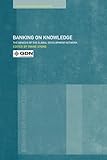Banking on knowledge : The genesis of the global development network
Publication details: London Routedge 2000Description: 266p xviISBN:- 9780415248488
- 338.900000 STO
| Item type | Current library | Shelving location | Call number | Status | Date due | Barcode |
|---|---|---|---|---|---|---|
 BOOKs
BOOKs
|
National Law School | NKCR SECTION | 338.9 STO (Browse shelf(Opens below)) | Not For Loan | 31838 |
Table of contents
Part 1: The GND and Knowledge for Development ;
1. The Genesis of the GND ;
2. Scan Globally, Reinvent Locally: Knowledge infrastructure and the localization of Kkowledge ;
3. The Instrumentalization of Development Knowledge ;
Part 2: Civil Society Engagement ;
4. Think Tanks in Independent Belarus: Catalysts for social transformations ;
5. New Partnerships in Research: Activists and think tanks: An illustration from the NCAER in New Delhi ;
6. Building Productive Partnerships for the Promotion of Reforms: The APOYO Institute in Peru ;
Part 3: Reform and Reconstruction ;
7. The Challenges of Intervention for a Cambodian Think Tank ;
8. Post-Communist Think Tanks: Making and Faking Influence ;
9. Influencing Government Policy Making ;
Part 4: Knowledge Across Borders ;
10. Southeast Asian Research Institutes and Regional Economic Cooperation ;
11. Globalization, Think Tanks, and Policy Transfer;
12. Think Tanks and the Ecology of Policy Inquiry ;
13. Conclusion: Knowledge, power and policy

There are no comments on this title.